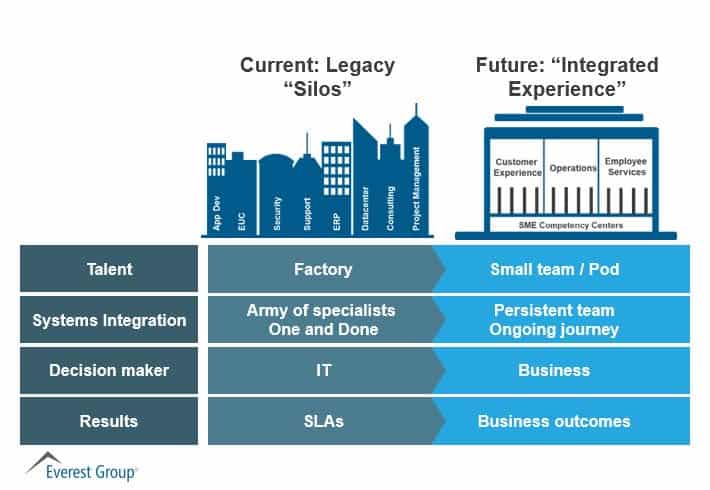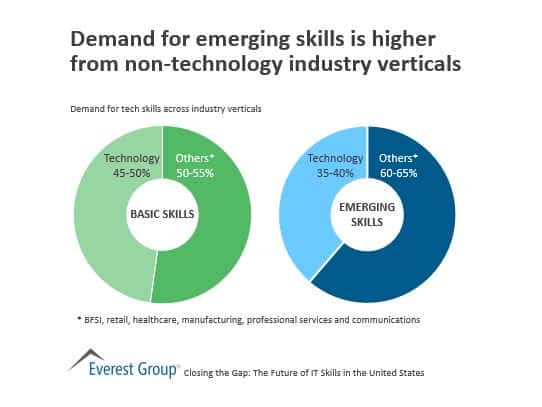Tomorrow’s Talent is Today’s Challenge! | Sherpas in Blue Shirts
Advances in new digital technologies, the emergence of new competitors, new sourcing models, and changing customer expectations are dramatically changing the type of IT skills enterprises across industry verticals require. And, with new service delivery paradigms such as automation, agile, and Artificial Intelligence (AI) becoming mainstream, the underlying service delivery models to support the new talent demand profile are also undergoing significant changes. We expect technology themes such as data management and analytics, omnichannel customer experience, and cloud adoption to dominate near-term demand, and cybersecurity, Service Oriented Architecture (SOA)-based application design, and agile delivery methodologies to become mainstream.
So, what does this mean from a talent perspective? Below are four takeaways from Everest Group’s recent research, much of which is detailed in a newly-released viewpoint titled Closing the Gap – The Future of IT Skills in the United States.
1. New Role Creation
To support their business initiatives in the changing technological landscape, enterprises will have to create new roles. Examples of these include:
- Chief Digital Officers (CDOs) and digital strategists to drive the adoption of design methodologies
- Chief Innovation Officers (CIOs) to source and evaluate disruptive ideas from innovation in technology and business models
- Anthropologists and psychologists to help foster human-centered design thinking
- Data architects and data scientists to build a holistic data strategy and generate insights to offer tailored experiences
- Agile coaches and scrum masters to deliver using the agile methodology at scale
- Enterprise security engineers to design and evaluate security measures across all phases of SDLC
- Automation architects and Machine Learning (ML) experts to develop automated scripts.
2. New Architecture
The technology revolution is leading to an integrated “thin slice” architecture that is enabled to deliver end-to-end experience transformation. This full-stack structure is a sharp deviation from the legacy silo-based architecture that has fundamentally different attributes for delivery of technology services in enterprises. From a talent perspective, traditional siloed factory models are evolving into smaller teams/pods with capabilities cutting across areas such as application development, infrastructure support, and security. Demand for full-stack engineers will increase significantly as the demand for this future integrated stack becomes more prominent across enterprises. Enterprises will need to invest in upskilling and cross-skilling their existing talent at scale and speed to be able to pivot to this new model.

3. Demand Shift for Tech Skills
Emerging technology themes will increase demand for some tech skills, and reduce demand for others. For instance, we expect demand for emerging skills such as Go and R programming to increase considerably, as enterprises explore the adoption of big data and AI solutions. On the other hand, we expect demand for skills specific to middleware tools, such as TIBCO, to remain low-medium, driven by increased adoption of offshoring and automation. Enterprises must have a good understanding of hard-to-hire skills in order to effectively chart out their talent roadmap. Key decisions such as local hiring versus offshoring will also revolve around expected demand and supply for skills.
4. Non-Technology Industry Verticals Demand Increasing
Demand for tech talent from non-technology industry verticals is increasing. From banks to retail firms to healthcare providers, technology-led solutions such as robust mobile applications and chatbots are being leveraged to enhance the customer experience. With enterprises focusing on building in-house capabilities, competition for tech talent has increased significantly in the past two to three years. Everest Group’s recent analysis indicates a higher demand from non-technology industry verticals for emerging skills such as configuration management tools (e.g., Ansible, Chef), JavaScript libraries (ReactJS, AngularJS), datacenter solutions (e.g., skills in handling VMWare, AWS, Azure), and automation tools, as compared to demand for basic skills like programming languages such as C and SQL.

To learn more about the emerging technology themes, their impact on talent requirements, the skills we expect to gain importance in the future, and their supply outlook, please read our viewpoint on skills of the future in the U.S. And feel free to share your opinions and stories on how you are managing tech-talent directly with us at [email protected] or [email protected].
